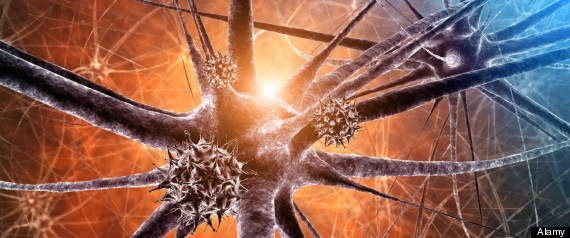Physicists: The Universe Is A

The idea of the universe as a ‘giant brain’ has been proposed by scientists [1] – and science fiction writers – for decades.
But now physicists say there may be some evidence that it’s actually true. In a sense.
According to a study published in Nature’s Scientific Reports, the universe may be growing in the same way as a giant brain – with the electrical firing between brain cells ‘mirrored’ by the shape of expanding galaxies.
The results of a computer simulation suggest that “natural growth dynamics” – the way that systems evolve – are the same for different kinds of networks – whether its the internet, the human brain or the universe as a whole.
The Brain — the Universe; Photo ©Copyright alamy.com A co-author of the study, Dmitri Krioukov from the University of California San Diego, said that while such systems appear very different, they have evolved in very similar ways.
The result, they argue, is that the universe really does grow like a brain. The study raises profound questions about how the universe works, Krioukov said.
“For a physicist it’s an immediate signal that there is some missing understanding of how nature works,” he told Space.com. [2] The team’s simulation modeled the very early life of the universe, shortly after the big bang, by looking at how quantum units of space-time smaller than subatomic particles ‘networked’ with each other as the universe grew.
They found that the simulation mirrored that of other networks. Some links between similar nodes resulted in limited growth, while others acted as junctions for many different connections.
For instance, some connections are limited and similar – like a person who likes sports visiting many other sports websites – and some are major and connect to many other parts of the network, like Google and Yahoo.
No, it doesn’t quite mean that the universe is ‘thinking’ – but as has been previously pointed out online, it might just mean there’s more similarity between the very small and the very large than first appearances suggest.
By Michael Rundle, Huffingtonpost;



 Creators of mankind
Creators of mankind Description of “Tall white aliens”
Description of “Tall white aliens” Where they came from?
Where they came from? About hostile civilizations
About hostile civilizations The war for the Earth
The war for the Earth “Tall white aliens” about eternal life
“Tall white aliens” about eternal life Video: “Nordic aliens”
Video: “Nordic aliens” Aliens
Aliens Alien encounters
Alien encounters The aliens base
The aliens base UFO
UFO Technology UFO
Technology UFO Underground civilization
Underground civilization Ancient alien artifacts
Ancient alien artifacts Military and UFO
Military and UFO Mysteries and hypotheses
Mysteries and hypotheses Scientific facts
Scientific facts


















